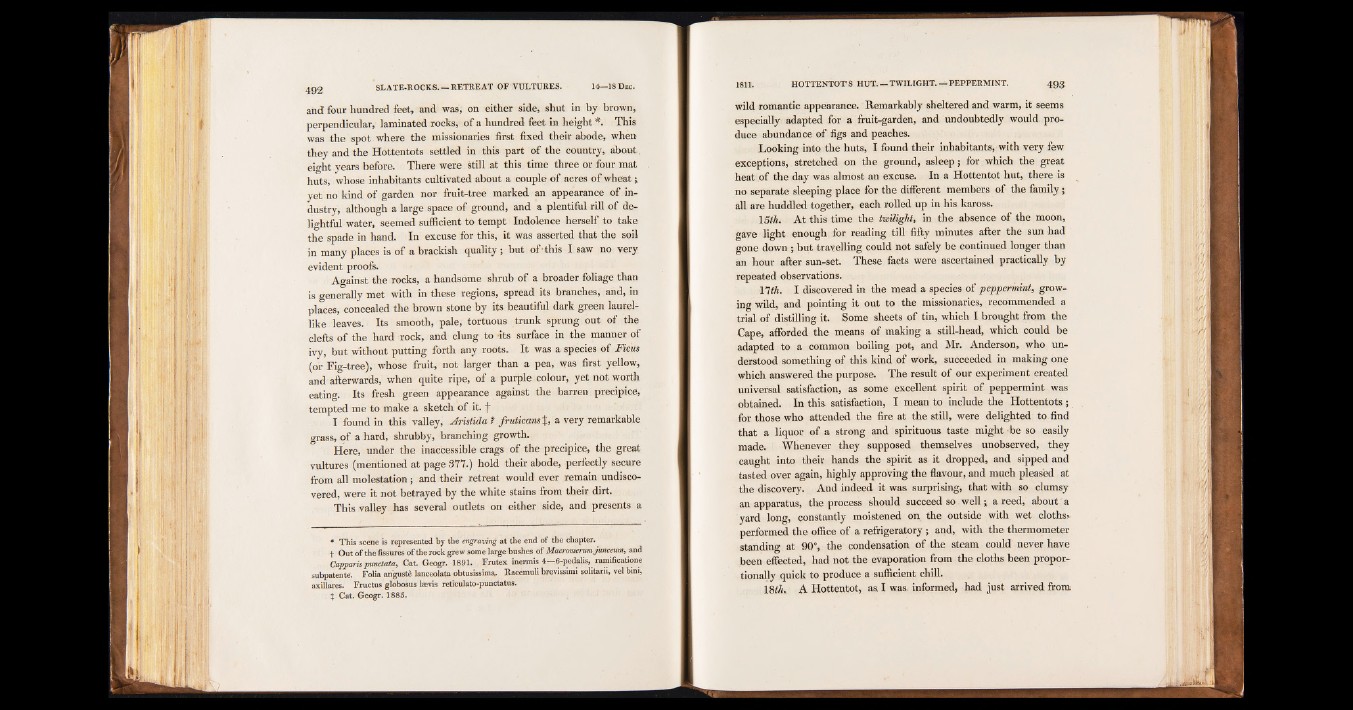
and' four hundred feet, and was, on either side, shut in by brown,
perpendicular, laminated rocks, of a hundred feet in height *. This
was the spot where the missionaries first fixed their abode, when
they and the Hottentots settled in this part of the country, about ,
eiirht years before. There were still at this time three or four mat
huts, whose inhabitants cultivated about a couple of acres of wheat;
yet no kind of garden nor fruit-tree marked an appearance of industry,
although a large space of ground, and a plentiful rill of delightful
water, seemed sufficient to tempt Indolence herself to take
the spade in hand. In excuse for this, it was asserted that the soil
in many places is of a brackish quality ; but of* this I saw no very
evident proofs.
Against the rocks, a handsome shrub of a broader foliage than
is generally met with in these regions, spread its branches, and, in
places, concealed the brown stone by its beautiful dark green laurellike
leaves. Its smooth, pale, tortuous trunk sprung out of the
clefts of the hard rock, and clung to its surface in the manner of
ivy, but without putting forth any roots. It was a species of Ficus
(or Eig-tree), whose fruit, not larger than a pea, was first yellow,
and afterwards, when quite ripe, of a purple colour, yet not worth
eating. Its fresh green appearance against the barren precipice,
tempted me to make a sketch of it. f
I found in this valley, Arktida ? fruticans%, a very remarkable
grass, of a hard, shrubby, branching growth.
Here, under the inaccessible crags of the precipice, the great
vultures (mentioned at page 377.) hold their abode, perfectly secure
from all molestation; and their retreat would ever remain undiscovered,
were it not betrayed by the white stains from their dirt.
This valley has several outlets on either side, and presents a
* This scene is represented by the engraving at the end of the chapter,
f Out of the fissures of the rock grew some large bushes of Macromerumjunceum, and
Capparis punctata, Cat. Geogr. 1891. Frutex inermis 4—6-pedalis, ramificatione
subpatente. Folia angustè lanceolata obtusissima. Racemuli brevissimi solitari!, vel bini,
axillares. Fructus globosus lsevis retieulato-punctatus.
. % Cat. Geogr. 1885.
wild romantic appearance. Remarkably sheltered and warm, it seems
especially adapted for a fruit-garden, and undoubtedly would, produce
abundance of figs and peaches.
Looking into the huts, I found their inhabitants, with very few
exceptions, stretched on the ground, asleep; for which the great
heat of the day’ was almost an excuse. In a Hottentpt hut, there is
no separate sleeping place for the different members of the family;
all are huddled together, each rolled up in his kaross.
15th. At this time the twilight, in the absence of the moon,
gave light enough for reading till fifty minutes after the sun had
gone down ; but travelling could not safely be continued longer than
an hour after sun-set. These facts were ascertained practically by
repeated observations.
n th . I discovered in the mead a species of peppermint, growing
wild, and pointing it out to the missionaries, recommended a
trial of distilling it. Some sheets of tin, which I brought from the
Cape, afforded the means of making a still-head, which could be
adapted to a common boiling pot, and Mr. Anderson, who understood
something of this kind of work, succeeded in making one
which answered the purpose. The result of our experiment created
universal satisfaction, as some excellent spirit of peppermint was
obtained. In this satisfaction, I mean to include the Hottentots ;
for those who attended the fire at the still, were delighted to find
that a liquor of a strong and spirituous taste might be so easily
made. Whenever they supposed themselves unobserved, they
caught into their hands the spirit as it dropped, and sipped and
tasted over again, highly approving the flavour, and much pleased at
the discovery. And indeed it was surprising, that with so clumsy
an apparatus, the process should succeed so well; a reed, about a
yard long, constantly moistened on the outside with wet cloths»,
performed the office of a refrigeratory ; and, with the thermometer
standing at 90°, the condensation of the steam could never have
been effected, had not the evaporation from the cloths been proportionally
quick to produce a sufficient chill.
18i&. A Hottentot, as I was informed, had just arrived from